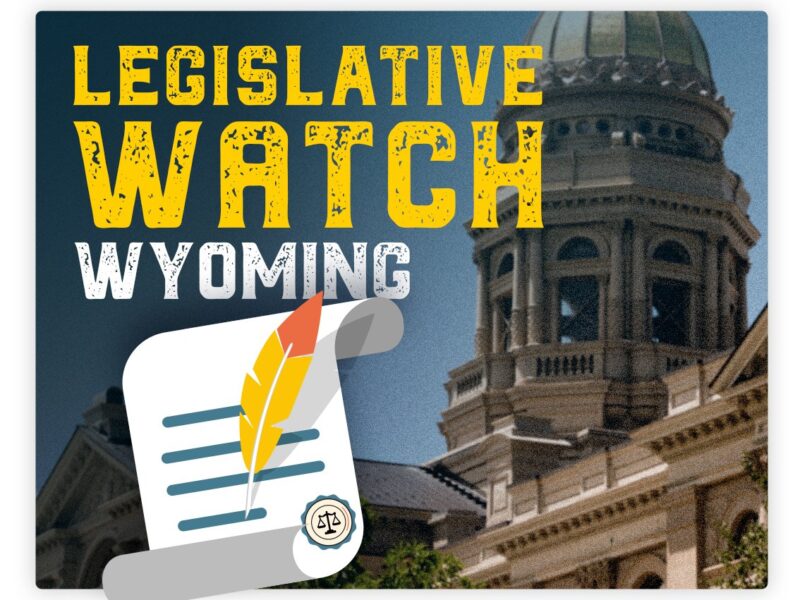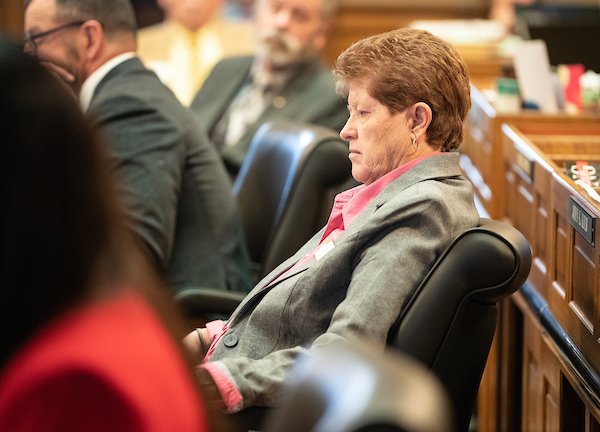LEGISLATIVE WATCH WYOMING: Senate Passes 988 Suicide Prevention Services Bill
Bill heads back to the House for review of amendments
- Published In: Politics
- Last Updated: Feb 16, 2023

By Shen Wu Tan
Special to the Wyoming Truth
This story has been updated as of 8:30 a.m. MT on Feb. 16.
The Senate on Wednesday voted in favor of a bill that establishes a trust fund to back 24/7 local suicide prevention services, which mental health advocates believe are critically needed in a state with one of the highest suicide rates per capita.
House Bill 65 or “988 suicide prevention” passed the chamber with a vote of 19-12. The bill would establish a trust fund for 988, the mental health crisis hotline system that launched nationally last summer, to help fund call centers and other suicide prevention services.

“I believe we need to take whatever steps we can to decrease suicide in our state,” said Sen. Wendy Schuler (R-Evanston), who voted yes on the measure. “This may only be one tool in the toolbox, but I think we have to start finding solutions. We are such a rural state with long winters and cold, windy weather and not a lot of resources, especially in some of our small communities, to help our constituents when life seems unbearable.”
The 988 system trust fund would include funds assigned to the account by law and money collected from federal grants, gifts, donations and other contributions. During each fiscal year beginning July 1, 2024, earnings from the trust fund would be appropriated to the Wyoming Department of Health, allowing it to spend 5% of the previous five-year average market value of the trust fund account. Until the trust fund has been in place for five years, its average market value would be the average market value for the years it has existed.
The bill also states that the state health department should request an appropriation for implementing the act in its next budget request for the following fiscal biennium. Senators further amended the bill to have the department make “reasonable efforts” to secure donations, including working with charitable foundations.
For years, Wyoming has ranked among the top states nationwide for its high suicide rates. In 2021, Wyoming saw 189 suicides, or 32.8 suicides per 100,000 individuals – the most reported since 2004 when the state health department began publishing data. The suicide rate for Wyoming is also more than double the nationwide rate of 13.5 suicides per 100,000 people. The 2021 suicide rate is up from the 30.6 rate recorded by the health department for 2020.
The original version of the House Bill 65 allocated $40 million from the legislative stabilization reserve account to the 988 system trust fund account and $6 million for the trust fund reserve account.
History of the bill and Wyoming’s suicide prevention services
Andi Summerville, executive director of the Wyoming Association of Mental Health and Substance Abuse Centers who brought forth the original bill, told the Wyoming Truth that the bill as it currently stands is “landmark legislation,” but noted there have been conversations about appropriations.
“If the bill is signed into law, it guarantees Wyoming residents access when they’re in probably one of the worst moments of their lives,” Summerville said. “They’re in some type of mental health crisis, and they’re having suicidal thoughts and having those local call centers means that their calls are being taken by local Wyoming residents, trained crisis counselors who know the state, who know the geography, who know where the resources are and can really provide the best access to mental health services going forward.”
She estimates it will cost $1.2 million a year to fund Wyoming’s call centers.
While many lawmakers discussed the need for suicide prevention services, they also expressed concerns about financing them and removed the $46 million appropriations from the bill.
Other legislators questioned whether establishing a trust fund is the best option for financing 988 services, including Rep. Tony Locke (R-Casper).
“This issue deserves our attention, of course, but I don’t believe that the creation of this trust fund account is the right answer,” said Locke, who voted no on House Bill 65 last month. “I think we take this and keep a very close eye on it, and we work closely with all of the appropriate organizations to make sure we put the right solution in place…”
Due to amendments made in the Senate, House Bill 65 goes back to the House for concurrence—“action by which one house agrees to a proposal or action that the other house has approved.”
If the House approves the changes, the bill will head to Gov. Mark Gordon’s desk; he will have three days to take action on the legislation.
Wyoming was the only state without a suicide lifeline call center until 2020, when the legislature appropriated about $400,000 for two years to launch one. Previously, out-of-state suicide call centers picked up all calls from Wyoming.
Wyoming obtained around-the-clock in-state coverage of suicide calls with the help of federal funding when 988 launched in July. The two local call centers, Wyoming LifeLine in Greybull and the Central Wyoming Counseling Center in Casper, each received $60,000 in federal grants to expand their hotline services to 24/7 coverage.
Wyoming LifeLine now answers calls from 2 a.m. to 4 p.m.; the Central Wyoming Counseling Center takes calls from 4 p.m. to 2 a.m.
Last year, the state health department approved proposals from the two call centers for the $2.1 million in COVID-19 relief funds allocated for expanded suicide prevention services, according to Matthew Petry, senior administrator for the department’s behavioral health division.
However, these are one-time relief funds. Stakeholders in the mental health field brainstormed ideas to sustainably fund ramped-up services.













